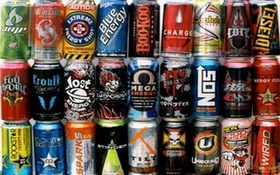 Questioning the safety of energy drinks, a March 19 letter signed by 18 doctors urges the Food and Drug Administration to rigorously apply existing Generally Recognized As Safe standards for soft drinks to energy drinks and other beverages in which caffeine is an additive. The letter also addresses the association between energy drinks and adolescents and comparisons between coffee and energy drinks.
Questioning the safety of energy drinks, a March 19 letter signed by 18 doctors urges the Food and Drug Administration to rigorously apply existing Generally Recognized As Safe standards for soft drinks to energy drinks and other beverages in which caffeine is an additive. The letter also addresses the association between energy drinks and adolescents and comparisons between coffee and energy drinks.“We conclude that there is neither sufficient evidence of safety nor a consensus of scientific opinion to conclude that the high levels of added caffeine in energy drinks are safe under the conditions of their intended use, as required by the F.D.A.’s Generally Recognized As Safe (GRAS) standards for food additives,” the letter said. “To the contrary, the best available scientific evidence demonstrates a robust correlation between the caffeine levels in energy drinks and adverse health and safety consequences, particularly among children, adolescents and young adults.”
The F.D.A. previously has said it is investigating adverse health reports associated with people who drank 5-Hour Energy products, Rockstar energy products (including 13 deaths) and Monster Energy products (including 5 deaths). The reports do not represent any conclusion by the F.D.A. about whether the products caused the adverse events, according to the agency.
The F.D.A. has recognized 200 parts per million (p.p.m.) of caffeine, or about 71 mg per 12-oz serving, as GRAS for soft drinks. According to the doctors’ letter, many energy drinks contain as much as 100 mg of caffeine per 8-oz serving and some contain as much as 300 mg per 8-oz serving.
A 16-oz Monster Energy drink contains about 160 mg of caffeine, said Rodney Sacks, chairman and chief executive officer of Monster Beverage Corp., Corona, Calif., in a Feb. 27 earnings conference call. In the call he said it is estimated about 50 billion cans of energy drinks have been sold worldwide and consumed safely over the past 25 years.
In regard to youth, the letter from the doctors pointed to a 2010 F.D.A. study that showed 65% of energy drink users are of the ages 13 to 35. According to a study published in the March 2011 issue of Pediatrics, 30% to 50% of energy drinks are consumed by adolescents and young adults.
Mr. Sacks in the Feb. 27 call said teenagers consume more caffeine from coffee than they do from energy drinks. He pointed to a 2012 national coffee drinks trends report from the National Coffee Association of USA, Inc., New York. According to the report, more than 50% of coffee drinkers said they began drinking coffee at least once a week between the ages of 13 and 19.
The doctors’ letter pointed to three differences between coffee consumption and energy drink consumption.
First, the caffeine in the coffee is naturally occurring while the manufacturer may add the caffeine in the energy drinks, which means energy drinks are subject to F.D.A. regulation because of food additives. Second, many energy drinks exceed the caffeine concentration of coffee.
Mr. Sacks of Monster Beverage in the Feb. 27 call said a 16-oz Starbucks’ coffee contains about 330 mg of caffeine, or more than double the amount found in a 16-oz Monster Energy drink.
Third, coffee typically is served hot, tastes bitter and is sipped or consumed slowly, according to the doctors’ letter. Energy drinks typically are carbonated, sweetened drinks that are served cold and may be consumed more quickly. The marketing of energy drinks may encourage people to drink large quantities quickly by using such phrases as “pound down” and “chug it down.”
Mr. Sacks in the Feb. 27 call said, “We also do not accept that consumers tend to drink coffee more slowly than energy drinks, which has also been suggested. On the contrary, coffee cools quickly, and consumers generally prefer to drink their coffee before it becomes lukewarm. Additionally, a large percentage of coffeehouse coffees are not consumed and are positioned as cold drinks, i.e., frappuccinos, ice café, mochas, etc.”
The doctors’ letter also linked energy drinks to childhood obesity and said a 24-oz can of Monster Energy contains 81 grams of sugar.
Doctors from a variety of fields signed the letter sent to Margaret Hamburg, commissioner of the F.D.A. They included Amelia M. Arria, Ph.D., director for the Center on Young Adult Health and Development at the University of Maryland School of Public Health in College Park, Md.; Mary Claire O’Brien, M.D., associate professor at Wake Forest School of Medicine in Winston-Salem, N.C.; Roland R. Griffiths, Ph.D., a professor in the departments of psychiatry and neuroscience at Johns Hopkins University School of Medicine in Baltimore; and Patricia Crawford, Dr. P.H., R.D., adjunct professor and director at the Atkins Center for Weight and Health at the University of California in Berkeley, Calif.





